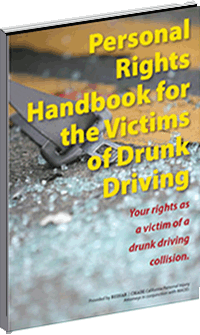Personal Rights Handbook for the Victims of Drunk Driving

Mothers Against Drunk Driving once circulated an effective anti-DUI poster. It pictured several shot glasses filled with whiskey with the headline: "How Many Shots Before It's Murder?" The poster underscores one, long-neglected truth about those who insist on drinking and driving -- when does this senseless, irresponsible act rise to the level of murder? Almost 500,000 people per year are injured by drunk drivers in the U.S. Or about one every minute.
In 2008, an estimated 11,773 people died in alcohol-impaired traffic collisions. Three in every 10 Americans will be involved in an alcohol-related collision in their lives. In the U.S., crashes related to alcohol cost approximately $51 billion in damages every year.* These staggering statistics prove drunk driving needs to be eliminated.
At Bisnar Chase Personal Injury Lawyers, we're committed to helping MADD do just that. As a drunk driving victim, you may not know your rights when it comes to the law. That's why we've developed this handy guidebook to assist you in understanding the legalities of being a drunk driving victim, not only to help you seek justice against off enders, but also to help you recover monetary damages for injuries or wrongful death.
As a drunk driving collision victim, you should know:
Drunk drivers face criminal charges and civil liability.
Not only do drunk driver offenders face criminal charges punishable by fines and jail time, they can also be held liable for civil damages. Monetary compensation may be awarded for things such as medical bills, loss of income, property damage and pain and suffering. What's more, punitive damages, or compensation that exceeds a victim's actual losses, may also be awarded, to punish the offender for malicious or willful misconduct and to deter him or her from driving drunk in the future.
You can be compensated for injuries, losses and the death of a family member.
Injuries from a drunk driving collision can have lifelong implications, including putting a significant financial strain on victims and their families. When a loved one has been killed by a drunk driver, surviving spouses and dependents suffer not only the physical and emotional loss, they can suffer a tremendous financial loss as well. As a drunk driving victim, you may be entitled to civil damages for injuries or wrongful death, depending on the case.
Restitution is separate from civil damages.
As a part of the punishment imposed on a convicted drunk driver by a court in a criminal case, a judge can order the drunk driving offender to pay "restitution" to the victims of the crime. Often, a restitution order directs the offender to pay the victims for the economic damages they suffered, including lost wages/earning ability of the injured person, medical expenses, property damage, mental health counseling expenses, lost wages of a parent who must miss work to take care of a child and attorney's fees incurred by the victim.
However, restitution is almost always substantially lower than legally recoverable damages a victim is entitled to in a personal injury claim since it does not compensate the victim for pain and suffering, disfigurement, or loss of the relationship one had with a victim killed by the drunk driver. When it comes to civil damages, you can file a personal injury claim against the offending party or parties involved to recover damages for things such as pain and suffering, loss of consortium, and wrongful death compensation, in addition to your economic damages. The amount of damages recoverable depends on the type and extent of the injuries and losses sustained as well as the jurisdiction in which the collision occurred.
Your losses can be paid through both a restitution order and civil damages, but payment to you of one recovery is likely to offset some portion, or all, of the amount recoverable with the other. You cannot be paid the same compensation twice. Your attorney will help you determine the offset, if any.
Drunk drivers may not be the only ones held liable.
In certain situations, the drunk driver who caused the collision may not be the only liable party. Dram Shop Liability law means the establishment or social host that supplied the alcohol may also be held liable and, in turn, could be sued for damages as well. It's important to know the laws in your state to determine whether the seller or supplier of alcohol might be liable.
Some states limit this liability to circumstances when alcohol is served or sold to someone who is visibly intoxicated. Also, it's important to keep in mind that an employer may also be held liable for the damages caused by the conduct of its employees or agents in some circumstances, if, for example, the employer hosts a work function at which alcohol is served and from which an employee drives while intoxicated and then causes a drunk driving collision.
Crime victims compensation programs can help.
You may be entitled to receive help with some of the costs and expenses you incur because of a collision caused by a drunk driver through governmental victim assistance and compensation programs as a victim of a criminal offense. One such program is Crime Victim Compensation, which can help drunk driving collision victims pay for some of the costs caused by the crash, including medical care, lost wages, funeral bills and other expenses. Visit the National Association of Crime Victim Compensation Boards (NACVCB) website at http://www.NACVCB.org or call (703) 780-3200 to learn how to contact your state program directly, to seek financial assistance.
For California residents and injuries occurring in California, visit http:// www.vcgcb.ca.gov/victims/default.aspx. In California, recoverable compensation through the California Crime Victim program could be as high as $70,000. Keep in mind that if a state program does pay money, it has the right to recover its payment, either by direct action against the drunk driver or as a lien against the recovery of the injured parties. This fund can not be used to pay a judgment or restitution on behalf of the drunk driver.
Bankruptcy protection doesn't apply to drunk drivers.
In recent years, laws have changed to prevent drunk drivers from obtaining relief of Chapters 7 and 13 Federal Bankruptcy Codes to avoid paying personal injury judgments or criminal restitutions for drunken driving claims. This means that if a judgment is awarded against a drunk driving offender and the offender then files for bankruptcy, the personal injury claims arising out of the drunk driving case will not be discharged - the offender will still owe the damages.
Ignition Interlock Devices: A solution to prevent drunk driving.
In summary, we would like to see laws making ignition interlock devices (IID) mandatory on all new cars as part of the solution. An IID is a system that links into a vehicle's ignition system and will not allow the vehicle to start unless the driver's blood alcohol level is below a pre-set limit. Thousands of lives that would be saved and countless injuries would be avoided if IIDs were standard equipment on all vehicles. It would be more economical for us as a society to pay the cost of mandatory IIDs than the $51 billion in damages suffered every year.
*Statistics provided by MADD and the Centers for Disease Control (CDC).
About MADD
MADD (Mothers Against Drunk Driving) is a non-profit organization founded in 1980 by Candace Lightner of Sacramento, California after her daughter was killed by a drunk driver. The driver who struck and killed Candace's daughter had two previous convictions for Driving While Intoxicated (DWI) and was out on bail for a drunk driving hit-and-run only two days prior. Today, MADD has over 600 local chapters across the United States and is the largest crime victims' assistance program in the world, with more than three million members and supporters. Since MADD's inception, drunk driving-related deaths have declined by 43 percent. MADD's commitment is to eliminate drunk driving through public awareness, victims' assistance programs, youth programs and public policy. MADD's mission statement "to stop drunk driving, support victims of this violent crime and prevent underage drinking," is indicative of its new focus to reach out to the nation's youth as well, to prevent minors from drinking and driving.
Related Articles:
The DUI Crash: Is it Murder on the Highway?
